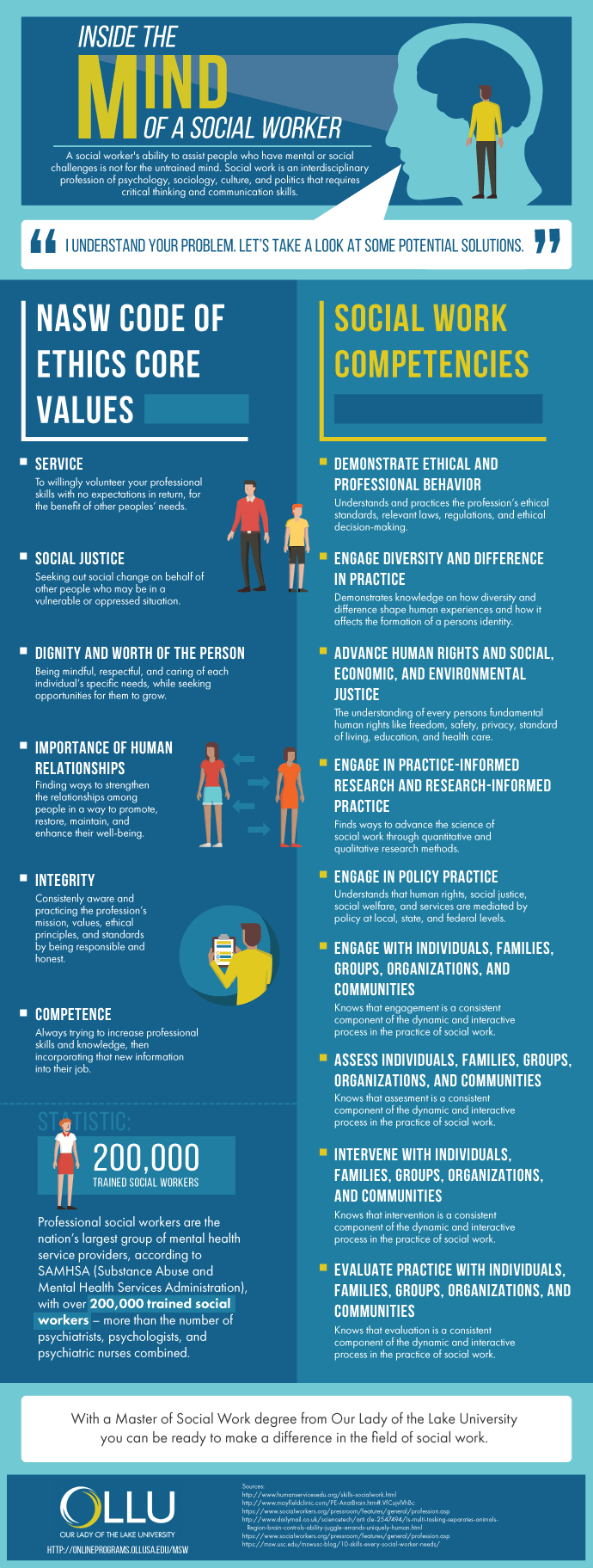Inside the Mind of a Social Worker [Infographic]
| 4 Min Read
It is nearly impossible to know what goes on in someone else’s mind but as social workers and others know, finding out as much as possible is quite instructive.
To make a difference, a social worker might not need all of the social values and skills listed in the infographic below, but those who exhibit the majority of them, however, are likely to add value to their profession for the long-term. As students go through the coursework in a Master of Social Work program they can determine what specific area of social work is better suited for them and their skill level.
Important values needed in the field of social work are continued growth, empathy, ethical boundaries, insightful, and psychology awareness. To be able to understand people’s circumstances and the motivations for their actions require a certain set of social skills. Social workers tend to possess some or all of the following skills; communication, organization, coordination, listening, multi-tasking, and an understanding of the developmental stages in adults and children.

Inside the Mind of a Social Worker
A social worker’s ability to assist people who have mental or social challenges is not for the untrained mind. Social work is an interdisciplinary profession of psychology, sociology, culture, and politics that requires critical thinking and communication skills.
“I understand your problem. Let’s take a look at some potential solutions.”
NASW Code of Ethics Core Values
Service
To willingly volunteer your professional skills with no expectations in return, for the benefit of other peoples’ needs.
Social Justice
Seeking out social change on behalf of other people who may be in a vulnerable or oppressed situation.
Dignity and Worth of the Person
Being mindful, respectful, and caring of each individual’s specific needs, while seeking opportunities for them to grow.
Importance of Human Relationships
Finding ways to strengthen the relationships among people in a way to promote, restore, maintain, and enhance their well-being.
Integrity
Consistently aware and practicing the profession’s mission, values, ethical principles, and standards by being responsible and honest.
Competence
Always trying to increase professional skills and knowledge, then incorporating that new information into their job.
200,000 Trained Social Workers
Professional social workers are the nation’s largest group of mental health service providers, according to SAMHSA (Substance Abuse and Mental Health Services Administration), with over 200,000 trained social workers – more than the number of psychiatrists, psychologists, and psychiatric nurses combined.
Social Work Competencies
Demonstrate Ethical and Professional Behavior
Understands and practices the profession’s ethical standards, relevant laws, regulations, and ethical decision-making.
Engage Diversity and Difference in Practice
Demonstrates knowledge on how diversity and difference shape human experiences and how it affects the formation of a person’s identity.
Advance Human Rights and Social Economic, and Environmental Justice
The understanding of every persons fundamental human rights like freedom, safety, privacy, standard of living, education, and health care.
Engage in Practice-Informed Research and Research-Informed Practice
Finds ways to advance the science of social work through quantitative and qualitative research methods.
Engage in Policy Practice
Understands that human rights, social justice, social welfare, and services are mediated by policy at local, state, and federal levels.
Engage with Individuals, Families, Groups, Organizations, and Communities
Knows that engagement is a consistent component of the dynamic and interactive process in the practice of social work.
Assess Individuals, Families, Groups, Organizations, and Communities
Knows that assessment is a consistent component of the dynamic and interactive process in the practice of social work.
Intervene with Individuals, Families, Groups, Organizations, and Communities
Knows that intervention is a consistent component of the dynamic and interactive process in the practice of social work.
Evaluate Practice with Individuals, Families, Groups, Organizations, and Communities
Knows that evaluation is a consistent component of the dynamic and interactive process in the practice of social work.
With a Master of Social Work degree from Our Lady of the Lake University you can be ready to make a difference in the field of social work.
References
- http://www.humanservicesedu.org/skills-socialwork.html
- http://www.dailymail.co.uk/sciencetech/eride_2547494/Is-multi-testing-separates-animals-Region-brain-controls-ability-juggle-errands-uniquely-human.html
- https://msw.usc.edu/mswusc-blog/10-skills-every-social-worker-needs/